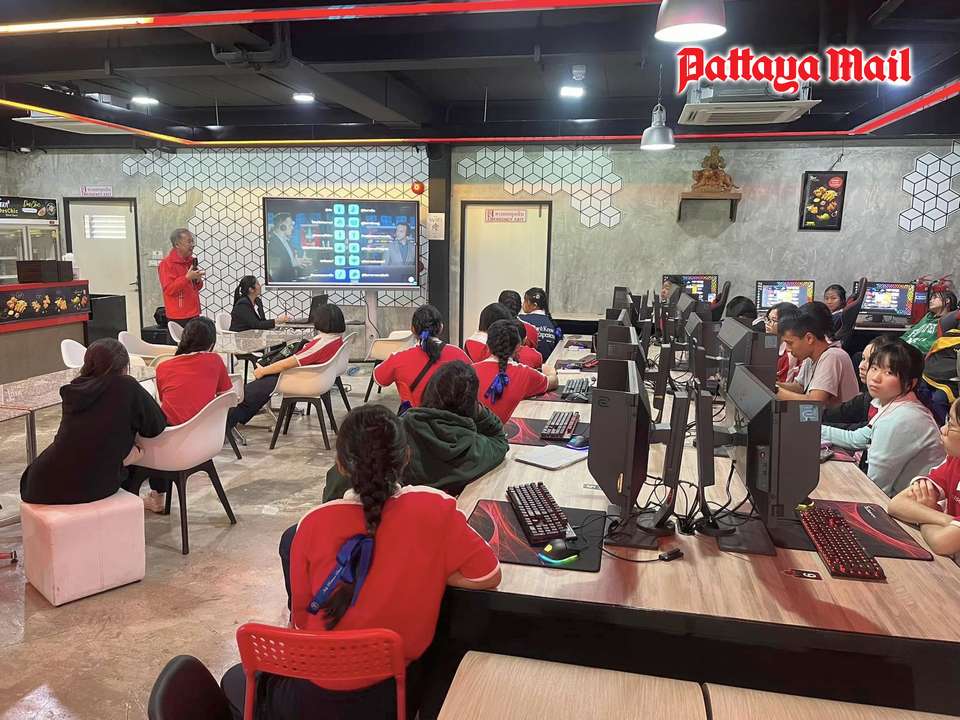

PATTAYA, Thailand – In a world where children are increasingly immersed in the digital, interactive landscapes of gaming, Max Kimberly-Thompson and his team at Squid Academy are working to bring esports into schools across Thailand. With roots in the UK, Squid Esports now aims to provide students here with structured, safe, skill-focused opportunities in gaming. From developing practical life skills to fostering teamwork and resilience, the initiative is capturing the interest of educators, students and even the Thai government – esports recently being recognised by the Sports Authority of Thailand. As a teacher, I have concerns and hopes for how gaming can be integrated into schools, and what we can do to help young people develop healthy habits – I sat down with Max to learn more about his vision for gaming here in Thailand.
Esports, short for “electronic sports,” has rapidly evolved from a pastime to a global industry. The gaming market, currently valued at over $200 billion, is expected to continue its rapid growth, potentially outpacing traditional sectors such as broadcasting, publishing and even the music industry. Predictions suggest that esports, along with game development and related tech industries, will likely surpass many of these traditional fields in the coming years, creating a vast array of potential career paths for young people.
What is Gamification?
Gamification, the use of game design elements in non-game contexts, has become a popular tool on EdTech platforms to promote student engagement and learning. Through features like points, badges and leaderboards, gamification taps into students’ natural desire for competition and achievement. Squid Esports’ model leverages gamification to teach young people key life-skills through esports, combining their interests with learning modules that cover a wide range of competencies – from online safety and resilience to sportsmanship and data analysis.

The Pros and Cons of Gaming for Young People
The rise of gaming has come with mixed opinions. Some view it as a distraction that keeps students glued to screens rather than engaging in physical activity or focusing on schoolwork. Others worry about the potential for unhealthy behaviours, from excessive gametime to interactions with toxic gaming communities. Yet, despite these drawbacks, structured gaming programs like Squid Esports aim to address these issues head-on.
For instance, Squid Esports’ coaches guide students on how to stay physically healthy while gaming, maintaining posture and breaks to offset the sedentary nature of the activity. Additionally, the Academy teaches students safe online behaviours, helping them navigate virtual spaces with awareness and respect.
But there are significant upsides to gaming in a school setting, which is why the Thai government has recognised esports as a valuable field, providing funding for schools to procure the necessary equipment. This enables students from diverse backgrounds to participate on an equal footing. While international schools may have greater resources, government support allows students in other schools to join in, creating a more inclusive environment. Equipment obtained for esports can also serve broader educational purposes, making these resources doubly beneficial.
Gaming as an Equaliser
While traditional sports have long been a staple of school life, not every student can excel in them. Esports can offer an egalitarian space where students who might not stand out in physical activities find a place to shine. For neurodiverse children in particular, esports presents an opportunity to socialise, build confidence and experience success on their own terms. By nurturing these inclusive spaces, esports can help students develop the confidence and communication skills often associated with team sports but in a setting that plays to their strengths – the hope being that they can take these skills out into their wider lives.

Opening Doors to a Growing Industry
Gaming’s booming industry is an enticing factor for students and parents alike. From professional gaming to careers in game development, marketing and developing technologies, esports opens doors to a variety of potential careers. Squid Esports also teaches students data analytics, a skill in high demand across many fields, enabling them to evaluate their own gaming performance and develop strategic thinking. This empowers students not only to improve their game but also to gain a foundation in a valuable professional skill.
A Healthier, Safer Way to Game
One of Squid Esports’ main goals is to counter the potentially harmful aspects of gaming. Without guidance, young gamers can pick up negative habits, such as being abusive towards others online or disregarding their own safety. Squid Esports’ curriculum is designed to instil positive, transferable skills like sportsmanship, resilience, and self-awareness, equipping students to interact responsibly in virtual environments.

In the end, Max and his team aren’t just bringing gaming into schools; they’re creating a structured environment that promotes healthy, sustainable gaming habits while providing a modern skill set applicable far beyond the screen. It’s a balanced approach, giving students the tools they need to enjoy gaming responsibly, while tapping into the industry’s growing potential. For expatriate parents in Pattaya considering what esports could mean for their children, Squid Esports is leading a new frontier in education, combining the best of digital engagement with real-world skills. As an educator, I feel we must respond to this growing influence on our young people in a positive, empowering way, and I applaud any business making strides to do that.
Visit Squid Esports on Facebook










